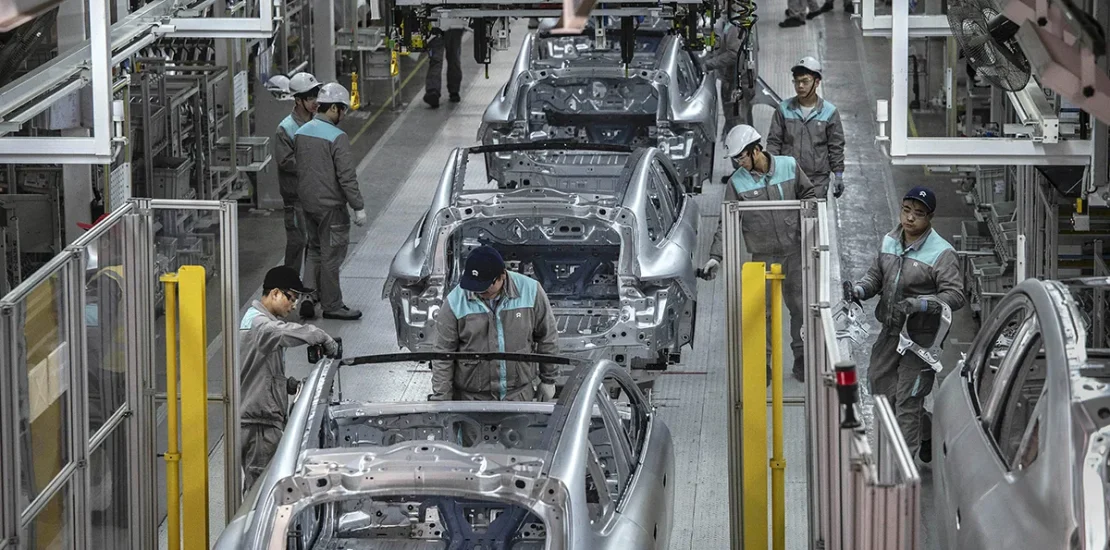- February 6, 2025
- Posted by: Regent Harbor Team
- Category: Global Economy

## China’s Long Economic Slowdown
The Chinese government has steadfastly avoided bold consumption stimulus policies. Despite this reluctance, boosting household spending is precisely what’s needed for sustainable growth.
### The End of China’s Economic Boom
The days of China’s rapid economic expansion are over. From a staggering [14% growth in 2007](https://data.worldbank.org/indicator/NY.GDP.MKTP.KD.ZG?locations=CN), the annual growth rate dwindled to less than 6% by 2023. Total debt, including internal and external, reached an alarming 365% of GDP in early 2024. This is notably higher than countries like Brazil or Indonesia, based on data from the [Institute of International Finance](https://www.iif.com/portals/0/Files/content/Global%20Debt%20Monitor_May2024_vf.pdf).
### Recurring Economic Challenges
Over the past 30 years, China has faced numerous crises, spurred by domestic imbalances or external shocks. These include overheating in the early ’90s, deflation post the 1997–98 Asian financial crisis, and the aftermath of the 2008 global financial crisis. Historically, China rebounded from these due to swift policy shifts and trade opportunities. Nevertheless, unresolved structural issues now make recovery challenging.
### Structural Underconsumption and Policy Decisions
Since the late ’90s, Chinese leaders have warned of an economy overly reliant on production at the expense of consumption. As early as 2013, Premier Wen Jiabao dubbed the economy “unbalanced and unsustainable” (Dissent(https://www.theguardian.com/world/2013/mar/05/china-wen-jiabao-growth-warning)). The pandemic further aggravated today’s slowdown. Post-COVID, the Chinese government hesitated on bold stimuli due to mounting debts. Expectations for policies to stimulate consumption, like Brazil’s Bolsa Familia, were not fully met. Instead, Beijing leaned on familiar strategies such as bank lending, debt refinancing, and mortgage incentives. Even the [IMF cautioned](https://www.bloomberg.com/news/articles/2024-10-24/china-fiscal-pack-insufficient-to-curb-deflation-risks-imf-says) against insufficient measures to curb potential deflation.
### Addressing Demographic Challenges
China’s economic dynamics have been significantly shaped by demographic changes. Historically, the nation enjoyed a demographic advantage with a vast labor force fueling low-wage manufacturing. However, this advantage waned post-2010 as young rural worker numbers dwindled. Unlike its Asian counterparts, China faced an early demographic transition due to its one-child policy. By 2022, its population [declined](https://www.npr.org/2023/01/17/1149453055/china-records-1st-population-fall-in-decades-as-births-drop) for the first time since the ’60s.
**Table 1: Comparison of Consumption Share of GDP**
| Country | Consumption Share > 50% | Demographic Advantages Utilized | Social Welfare Influence |
|————|————————-|——————————–|————————–|
| Taiwan | Yes | Yes | Strong |
| South Korea| Yes | Yes | Strong |
| Japan | Yes | Yes | Moderate |
| China | No | Limited | Weak |
### Technological Progress and Economic Growth
Despite vast investments in innovation, China’s progress in technological upgrades lags behind other Asian powerhouses. Many high-tech products depend heavily on foreign components. Government resources spurred breakthroughs in certain sectors, yet inefficiencies remain. The [rise](https://www.wipo.int/pressroom/en/articles/2020/article_0005.html) in patent numbers belies their commercial value. Issues of intellectual property rights and inefficient practices further compound these challenges.
### Sustaining Economic Control
Political stability remains paramount for the Chinese regime. Economic reforms designed to empower the labor class or liberalize financial systems could undermine the party’s control. As a result, China might prefer economic stagnancy while tightening its grip on society and revenue extraction. The focus on control mirrors strategies seen in regimes like North Korea or Venezuela. While many hope for economic reform, it seems Beijing may choose state security over economic rejuvenation.
**Author**: Ho-fung Hung, Henry M. and Elizabeth P. Wiesenfeld Professor in Political Economy, Johns Hopkins University.
Explore more about economic transitions at [Dissent Magazine](https://www.dissentmagazine.org/online_articles/chinas-long-economic-slowdown/).
